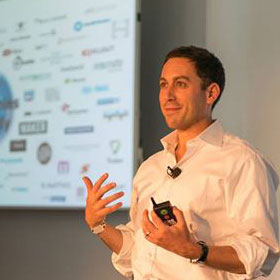The Edge of Democracy
Posted on .If you haven’t already read Edward Snowden’s interview with the Guardian I suggest you take a few minutes and dig in. For the uninitiated I will summarize it in two sentences. 1.) The US government is collecting a surprising amount of information on its own citizens. 2.) We should be concerned about the use of this data once our technology becomes more advanced.
I have been thinking about the second point for the past few weeks. It is hard to predict what technology will exist in the future, but there are signposts showing the general direction. Think back to 2001 when the original iPod was state of the art technology. Five million years of human innovation went into creating a device that was basically a hard drive with an audio jack. A decade later we have pocket computers that weigh a few ounces, communicate via wireless broadband, run on solid state memory, and consume a fraction of the power. Innovation is happening exponentially.
Modern devices can be used to record live events as they are happening, like Mitt Romney’s infamous “47%” speech, and broadcast them to everyone in the world using social media.
So how can this technology harm us?
In the wake of the Paula Deen squabble I read an online interview where Paula blamed the Jews for her press debacle. It was a horrible story, with a dozen direct quotes. I researched the source and the story turned out to be a hoax. However, it still reached a thousand Facebook comments within minutes of being posted. The same thing happened last year when Paul Krugman, a notable supporter of Obama’s fiscal policy, declared personal bankruptcy. These fake stories were not even a blip on the public consciousness, but it shows how easily we can be misled. And these were just simple text articles.
The good news is that audio and video are much harder to forge than text. It took Apple and SRI over ten thousand man-hours to produce the SIRI voice, and it still sounds like a robot. But that is changing too. I recently met with a company that can create a similar voice automatically using a few hours of source material. It is only a matter of time before we have the processing power and algorithms to make cloned speech indistinguishable from actual speech. And after that cloned video will be indistinguishable from real video. My guess is that in 10 years, an average person using a wearable computer will be able to literally put words in people’s mouths and publish it to the entire world anonymously.
This is a worrisome version of Snowden’s future. An independent media is vitally important to a Democracy – whenever there is a political coup, the first move a dictator makes is to take control of the airwaves. But imagine a future where we have a free media, but every piece of content is manipulated. Every recording is questionable. Every video is a forgery or a hoax. And there is no way to tell the difference.
Maybe this will once again produce a golden age for journalism, although instead of writers the media companies will employee fact checkers. Or maybe the NSA, with their giant databases of human behavior, will be able to verify fact from fiction. Either way I think it is going to be a bumpy ride.

Ian Sigalow
http://sigalow.comIan is a co-founder and partner at Greycroft Partners in New York City. He has been a venture capitalist since 2001.
AUTHOR JTaysom
Posted on 8:09 pm July 13, 2013.
Ian, IMHO the Government needs to know who you are. They issue birth certificates and death certificates and passports to allow them to collect taxes and control borders. But they don’t need to know what you like and dislike. Commercial organisations need to know what you like and dislike but except in a transaction that requires payment they don’t need to know who exactly you are. That separation is the basis I think for a resolution of the pickle we have gotten into. Technology now allow that separation to be implemented. I agree with your thoughts.
AUTHOR sigalow
Posted on 10:13 pm July 14, 2013.
JTaysom In the very near term all of these data points about what you like and dislike will be used to validate transactions – it is starting with commerce but moving to border security and toll roads. There is a very interesting company in the UK called Trustev doing this now. Even things like mouse movements can be used as personal identifiers.
I think the generation gap (at least in America) between Millennials and others is not about technology as much as personal attitudes towards online privacy. I have always assumed that everything I do online was being tracked somehow. I know we have discussed this at length…
AUTHOR Nardiii
Posted on 7:25 pm August 15, 2013.
I followed the Snowden story since day one and I agree with you 100%. I came across your blog while looking for a possible investor and I think I just read most of your posts. Very cool topics with lot’s of information in them.
Anyway, my name is Leo and I would love to send you my pitch deck so you can evaluate my Idea & demo. What would be the best way to go about this?
Thanks Ian.